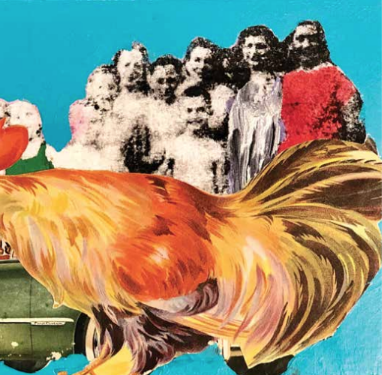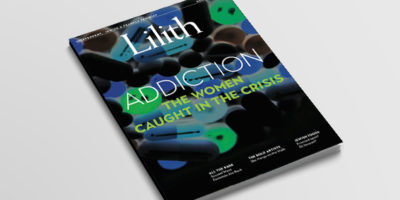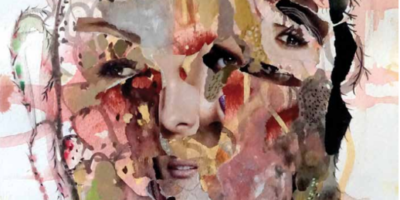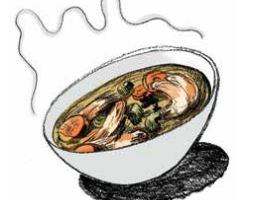
Fiction: Little Hen
 In those weeks of waxing darkness, I worked at Anna’s side, my fingers mimicking hers. We sat in the kitchen of my aunt’s place. I told Anna of my first days in the city, five years before. Of the time, for instance, my aunt had sent me for chickens and I came back empty-handed, crying into my elbow like a small child, unwilling to haggle or even to open my mouth out on the street.
In those weeks of waxing darkness, I worked at Anna’s side, my fingers mimicking hers. We sat in the kitchen of my aunt’s place. I told Anna of my first days in the city, five years before. Of the time, for instance, my aunt had sent me for chickens and I came back empty-handed, crying into my elbow like a small child, unwilling to haggle or even to open my mouth out on the street.
Anna snorted to hear of it. “What did you think would happen to you?” she said. “Afraid of a toothless chicken-plucker,” she said. She shook her head in pity and in disgust.
I wasn’t brave enough to invite Anna’s teasing more than once. There were so many ways to be wrong; at 16, I subsisted on a steady diet of small atonements. So I sat silently for hours at a time, those long evenings in the winter of 1912, while she taught me at my aunt’s Singer. She showed me how to make French darts, vertical darts, side seams. The things I wasn’t learning at the factory, where I made only sleeves, day in, day out. The lessons were Anna’s idea. She must have seen some promise in me.
Anna spoke and I listened. She spoke of her early tangles with New York: schoolmarms, landlords, a litany of bosses. And then she spoke of Vilna, where she was born. Of the time before her father disappeared. “He was a tailor’s assistant,” Anna said, speaking of her father. “To begin with.”
To Mama, Anna told me, she was Khanele, Little Anna. To Daddy: Hunele. Little Hen.
A new century. The workers in Vilna had been organizing. Jews. For who else made up the bulging undergrowth of needle-men, cutters, tinkerers, cobblers? In those days, the shtarkers—strapping Jews, too, not only Christians—were brought in, swinging pipes as well as fists. The small factory owners and the wholesalers paid to keep the striking workers in bandages. Her father used to say, Come, Hunele, we’re going to the Kitchen.
The Kitchen was in the crumbling center of the city, not far from the university and not far, either, from the Jews’ almshouse and the Jews’ hospital and other rooms filled to bursting with Jews. The Kitchen was heated by a great tile oven and, in winter and in summer, it was too warm. It smelled of cabbage and mildew. Two long tables ran front to back atop the packed-earth floor. And along the benches sat men like Anna’s father, elbows knocking those of their neighbors. She sat in her father’s lap and ate her soup. The soup was the worst she had tasted in her short life, Anna said. She nearly gagged now, speaking of it.
“But the food didn’t matter,” Anna said to me. The food was not the point. For this was the Cooperative Kitchen of the Vilna Needleworkers’ Union. Bowl by bowl, coin by coin, men like Anna’s father would unite Vilna’s workers. And after that, they would bring together all Lithuania’s, and then, in time, all of Russia’s. So Anna’s father said. The Kitchen would be the beginning, he promised, the means to nourish the consciousness of all those who didn’t set out for the West or land in Siberian prisons or (it still sometimes happened) wake up one morning as shop owners, may they rot in the earth. And in the meantime, you could get a bite to eat and dream of the future, when all men would be free.
Anna remembered the red-cheeked women stirring pots in the back. “They must have been the age then that we are now,” she said to me. Working girls. Revolutionaries. When one spoke, the others would shush her, straining to follow threads of arguments that ran up and down the tables in the din, where the men sat. Anna’s father called one over once, she told me. A girl with black braids and a pocked forehead. Galya, our comrade needs directions, Anna’s father said. The girl had nodded then. I’ll take him there myself, she said.
On her father’s lap, Anna listened to men mumbling and to men shouting. She knew some of the phrases they used. She spoke them to me now. Di natsyonale frage: the national question. Klasnbavustzayn: class consciousness. Ekonomishe teror: economic terror. But at the time she didn’t understand. Not truly.
“Now I understand,” she said, making me look her in the eye, pressing her fingers to my elbow as if to imprint those words upon my skin. She pushed back then from the table and stood beside me, not going anywhere, but standing all the same. By now I had let my aunt’s machine go idle. I didn’t want to miss a word.
Anna recalled an afternoon of endless rain. A rivulet ran below her feet on the dirt floor, there in the Kitchen. She had sat at the table with her father for so long she feared that she had wet herself; she felt between her legs and understood it was only rain that trickled between her boots. We have fists, too, her father had said then to the man across from him, white spittle at the joints of his mouth. No more fearful little Jews, he said. Anna spoke her father’s words to me.




